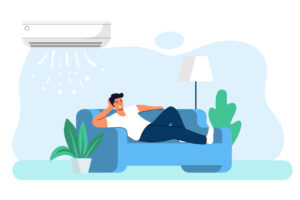AC manufacturers are continually improving AC equipment to attain optimum efficiency and comfort. Variable-speed ACs are some of the developments arising from innovations in AC technology. Explore the implications and benefits of variable-speed and three-phase HVAC systems in Evans, GA.
One-Stage Versus Two-Stage Air Compressors
A one-stage AC compressor is the most common HVAC system you’ll find in most homes in Evans. The compressor is usually off when room temperatures are lower than the thermostat’s setting.
It turns on when the temperature exceeds the setting. The one-stage HVAC system, in effect, operates at 100% capacity when regulating temperatures.
In Evans, temperatures in August are at lows of around 73 degrees Fahrenheit. If the thermostat setting is at 75 degrees Fahrenheit, HVAC systems will start running when temperatures exceed the setting. The process repeats, turning on and off as the weather changes throughout the day.
A variable-speed compressor can vary its speed depending on the cooling requirements. It doesn’t have to keep turning on and off to attain optimal comfort. It runs only when necessary, resulting in high levels of efficiency.
Two-stage HVAC systems fall between single-stage and variable-stage systems. They won’t turn on and off as much as single-stage ACs. But they’re less efficient than variable-stage compressors.
Variable Systems, Indoor Comfort and Humidity
A single-stage AC compressor can provide adequate comfort provided the installation meets professional standards. But it’s not as efficient as a dual-stage or variable-stage compressor. Humidity control can sometimes be challenging if the system runs only on or off modes.
A variable-stage compressor can run continuously at very low levels and will gradually dehumidifying the indoor air. Unconditioned air goes through the AC at a lower rate, allowing more time for dehumidification.
Your AC regulates humidity by pushing air through the evaporator coil. The vapor condenses into water droplets and channels it away from your cooling system. The on and off cycle in single-stage ACs may not run long enough to dehumidify the air.
Variable-stage Systems and Efficiency
An efficient cooling system consumes less energy for each unit of work. SEER (Seasonal Energy Efficiency Rating) is the standard that measures the efficiency of AC systems.
A variable-stage AC is more efficient than a single stage AC since it runs at different speed levels as needed. The most efficient cooling appliances are variable stage systems with a SEER rating of over 20.
A variable-stage system’s function is precise and doesn’t have to run at full speed when cooling. You can reduce the cooling costs by upgrading from a single-stage system.
Single-Phase and Three-Phase Power
A single-phase air conditioner works with a single-phase power supply system. Most homes run on a single-phase power supply, the standard for power distribution in the US. It operates on 60 hertz of alternating current.
A three-phase AC system works with a three-phase power supply system. The three-phase power distribution has three active and one neutral connection. Single-phase power distribution only requires one active and one neutral wire.
Three-phase systems are more stable and more efficient than single-phase power supplies. The stability of the power distribution is critical for equipment that runs on motors, such as your HVAC system. They provide more uniform power to appliances, reducing vibration and noise.
Installation Considerations for Variable Speed Systems
You must evaluate the implications of a variable-stage system before replacing your single-speed AC equipment. Cost is one of the principal considerations since a variable-stage system is more expensive.
Variable-speed systems occupy more space. The replacement needs to have adequate room for housing the new HVAC systems.
However, variable-stage systems run more efficiently and produce less noise. The quality of installation will also impact efficiency and home comfort. We recommend consulting our professional team of NATE-certified technicians before acquiring a new HVAC system.
We offer punctual emergency services to assist you when your AC is faulty. Our Trane Comfort Specialists have vast experience and skills to handle any project. Contact Doc Savage Heating & Air Conditioning, Inc., for prompt repair services in Evans, GA.
Image provided by iStock



